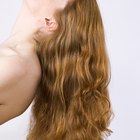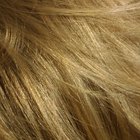
Ryan McVay/Lifesize/Getty Images
Healthy Afro hair is beautiful. However, Afro hair tends to be fragile, porous, dry and prone to damage, partly because the coiled structure of African-American hair prevents oil from spreading evenly through the hair. The problems become more pronounced if the hair is heat-styled or overprocessed. Curing rough, dry hair requires a regimen that adds oil to the hair, while minimizing damage and preserving the hair's natural oils.
Treat rough, dry hair to a hot oil treatment once every week, using a product with natural oils such as shea butter or olive oil. Apply the hot oil to the hair, then cover the hair with a plastic cap. Sit under a warm dryer for 15 to 20 minutes, or wrap your head with a warm towel. Wash your hair thoroughly to remove the oil.
Massage a light, leave-in conditioning oil into your hair every day. Use a natural oil such as jojoba, shea butter, royal jelly or coconut oil. Avoid products containing mineral oil or petroleum jelly, which clog the pores and dry the hair.
Wash your hair once a week, using a gentle, pH-balanced shampoo. Afro hair is naturally dry, and shampooing more often strips its oils and dries the hair further. Also, too-frequent shampooing prevents natural oils to coat the entire hair shaft. Avoid shampoos containing sulfates, which also tend to dry the hair.
Condition your hair each time you shampoo, using a moisturizing, protein-based conditioner containing amino acids, panthenol or hydrolyzed proteins. Massage the conditioner through the hair. Be sure to coat the ends, which are most prone to damage.
Rinse your hair with water following exercise, as rinsing adds moisture and prevents buildup of salt and sweat.
Comb your hair with a large-tooth comb, because small teeth can break the hair. If your hairstyle requires a part, use a rat-tail comb. Brush your hair with a natural bristle brush, which is gentler and less damaging to hair.
Protect your hair by wearing a scarf or cap at night, or sleep on a satin pillowcase. Otherwise, rubbing when you move during the night may cause broken hair and split ends.
Trim your hair regularly to remove dry, split ends. Many stylists recommend a trim every six to eight weeks, but close-cropped hair may need a trim as often as every four weeks.
Related Articles

How to Care for Dry, Damaged & Weak ...

Tips on Reducing Flyaway Hair

How to Manage Thick, Coarse ...

How to Control Frizzy Hair for ...

How to Remove Dandruff With Baking ...

How to Nourish the Scalp

How to Condition Hair After Using a ...

How to Repair Dry Tangled Hair

How to Moisturize Dry Hair Caused by ...

Dry Hair Treatment With Canola Oil

How to Maintain a Deep Wave Weave

How to Blow-Dry Afro Hair

How to Get Frizz-Free Hair When Your ...

How to Wash African-American Braids

How to Cleanse the Hair Without Water

How to Get Rid of Frizzy Straight Hair

How to Control New Hair Growth

Directions for Wrapping Black Hair With ...

Homemade Treatments to Make Hair Thicker

How to Moisturize Natural Braids
References
Writer Bio
M.H. Dyer began her writing career as a staff writer at a community newspaper and is now a full-time commercial writer. She writes about a variety of topics, with a focus on sustainable, pesticide- and herbicide-free gardening. She is an Oregon State University Master Gardener and Master Naturalist and holds a Master of Fine Arts in creative nonfiction writing.
Photo Credits
Ryan McVay/Lifesize/Getty Images